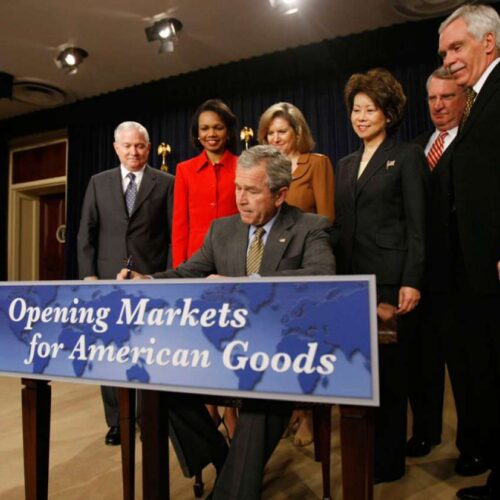Introduction
The number of bilateral and regional free trade agreements has been increasing worldwide, but the U.S. has been sitting on three free trade agreements for the last three years — with Colombia, Panama, and South Korea.
The agreements were signed during the Bush Administration, but the 110th and 111th Congress could not reach agreement. The 112th Congress has yet to take any action and the trade agreements cannot be implemented without Congressional approval.
Labor unions have been critical of the agreement with Colombia, citing the violent treatment of union leaders and activists in the country. Other critics are concerned that policies in Panama make it a tax haven for companies. The Obama administration has said it would work with relevant groups to reach a consensus on the Colombian and Panamanian agreements, but has not indicated a timeline, according to a report by the Congressional Research Service.
The South Korean agreement has received challenges from Detroit car makers, in particular Ford and Chrysler, for not being strong enough against South Korean barriers to auto imports. U.S. steel manufacturers and major labor unions also oppose the agreement. President Obama is under pressure to join the Colombia and Panama agreements to the Korean one before presenting it to Congress.
Policymakers and trade experts have debated the effectiveness of such initiatives and how they serve U.S. economic interests. Some experts believe the U.S. will be at a disadvantage if it fails to join these free trade agreements, since other countries are forming free trade agreements that do not include the U.S. Others warn that trade agreements export jobs to countries with lower wages and lax environmental regulations. As a result, many labor unions and environmental groups have been vocal opponents of trade liberalization.
Members of Congress must weigh the effect on their constituencies with the impact nationwide. Trade agreements typically affect some sectors positively, while having an adverse effect on others. Obama has expressed support for free trade agreements as part of a longer-term trade policy designed to expand U.S. exports and enforce U.S. laws and rights.
FAST FACT: Obama has also shown interest in joining the Trans-Pacific Strategic Economic Partnership Agreement, a free trade agreement with countries on both sides of the Pacific. Original members include Brunei, Chile, New Zealand and Singapore, but other countries, like Australia, Peru, and Vietnam are considering the agreement.
Following are other new watchdog reports released by the Government Accountability Office (GAO), various federal Offices of Inspector General (OIG), and other government entities.
ENVIRONMENT
- A significant portion of stimulus grants for the EPA’s diesel emission reduction program were unspent. As of June 2010, 49 grants with a value of over $101 million had spent less than 10 percent of the funds and 85 percent of grantees had not finished projects by the completion date. (EPA Inspector General)
NATIONAL SECURITY
- The first six days of the no-fly zone in Libya cost an estimated $400 million. About $75 million will go towards the replacement of the F-15 fighter jet that crashed. (Congressional Research Service)
Read more in Accountability
Accountability
Memo suggests FBI had mole inside ABC News in 1990s
Agents treated reporter like informant, raising question: Who else?
Accountability
Daily Watchdog: Deteriorating conditions in Central America pose security threat
Deteriorating conditions in Central America pose security threat


Join the conversation
Show Comments